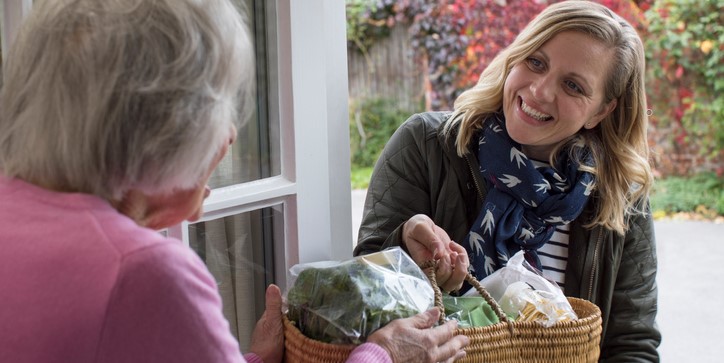Creating a Community by Encouraging Mental Health Awareness and Kindness
- Written by Sue King

For most of us, with uncertainty comes discomfort and fear. And when that uncertainty starts to impact how we carry out our day-to-day living, the toll on our mental health can be enormous. For those who are already living with mental illness, the dire predictions, alarm and very necessary social distancing required to help mitigate the spread of COVID-19 only exacerbates challenging symptoms and the sense of isolation. Many might be experiencing mental health challenges for the first time as a result of all that is unfolding before us. Feeling anxious about our own health and that of our loved ones, about how we’re going to get food, medicine and the things we need, about how we work, play and make plans during this time of change and isolation is understandable.
At Mental Health America of Eastern Missouri, we believe that mental health is fundamental to the quality of every human life and we are proud that throughout our 75-year-history, we have remained deeply committed to promoting mental health and wellness for everyone. During this challenging time, our mission is more relevant than ever. As we settle into the changes that swirl around us, we have an opportunity to build a community of caring by tending to our own mental health and being intentional about reaching out to those who might also be struggling.
Here are just a few ways we can build this community of caring:
- Take care of our own mental health. When we are preparing for take-off in an airplane, we are instructed on how to proceed in case of an emergency. Remember that part about securing your own oxygen mask first so you can more easily help the person next to you? Apply this concept as you tend to your mental health during this challenging time. Make certain that you are getting adequate rest, eating properly, getting some physical activity and staying connected with others. Stay informed, but know when to take a break from media if it’s having a negative impact on your mental health. If you are experiencing overwhelming feelings of anxiety, depression or other mental health challenges, consult with a physician if possible. Check out our online mental health screening tool to help you determine if you should seek treatment.
- Reach out to those in your circle who struggle with mental health challenges. Call, text, email or use other communications tools to let them know you are thinking about them. Ask if they have everything they need and let them know you are available to talk or help in other ways. This is something that we should be doing regularly anyway, but now is an especially good time to do what we can to reach those who already have mental health vulnerabilities.
- Check in with friends, family and others who might be experiencing mental health challenges for the first time. It never hurts to just reach out to make sure our friends, co-workers, family members and neighbors are okay. Even those who might normally seem mentally healthy could be facing for the first time in their lives feelings of anxiety, depression or even psychosis, and might not have the resources or courage to ask for help. By checking in, you are opening the door for healthy conversations and a pathway to support.
- Be mindful about checking in with older adults. This group of people is especially vulnerable to not only contagion, but also social isolation. If restricted from visiting loved ones in retirement communities or nursing homes, do still try to maintain contact by calling and texting if possible. Send letters and cards. Also be sure to check in with those 60+ who are in your neighborhoods and church communities.
- Remember that technology is a great way to stay connected. While we’re all being encouraged to practice social distancing, that doesn’t mean we have to lose touch completely. Reach out to others through email, social media and other technology platforms. Now might be a good opportunity to try out something new!
- Let’s be patient with ourselves and others when out in the community. It’s important to remember that not everyone responds to situations in the same way. Anxiety and depression manifest in different ways for different people. While it’s tempting to correct and challenge those who behave unattractively in stores, the doctor’s office, even within our own homes during this time of stress, the best way to address this is by modeling supportive, thoughtful behavior ourselves. Instead of hoarding items like toilet paper and hand sanitizer, ask others if they have what they need. Share positive messages and helpful information on social media. Be generous with smiles and other opportunities to connect to one another that send a powerful message: we are not alone and we are a community.
- Interested in finding out more about how to manage anxiety during this challenging time? Check out these helpful links:
- The Mental Health Side of Corona: Coping with Fear and Uncertainty
- 4-7-8 Breathing Technique to Relieve Anxiety and Stress
- Check out our website's Knowledge Base for more information about mental health.
About The Author
 Sue King is President and CEO of Mental Health America of Eastern Missouri.
Sue King is President and CEO of Mental Health America of Eastern Missouri.






















